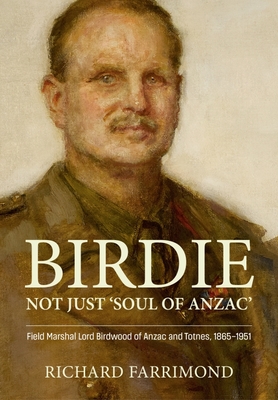Birdie - Not Just 'Soul of Anzac': Field Marshal Lord Birdwood of Anzac and Totnes, 1865-1951

Birdie - Not Just 'Soul of Anzac': Field Marshal Lord Birdwood of Anzac and Totnes, 1865-1951
Historians have long cited Field Marshal Lord Birdwood as being overdue comprehensive study. His Indian and South African service experiences prepared him for his significant achievements at Gallipoli, commanding the Anzacs, and leading the successful final evacuations. Throughout his life he displayed great diplomatic acumen and his later years were both militarily and imperially significant.
FM Lord Birdwood was born in India in 1865. His father, from a West Country landed family, was under-secretary to the government of Bombay. Birdwood was educated at Clifton and Sandhurst, and joined the Indian Army in 1886. His early service in close relationship to Indian cavalry soldiers made a lasting impact on his life. During this time, he effected his first viceregal connections and joined the viceroy's bodyguard. Success in the Boer war and a developing professional relationship with Lord Kitchener brought steady career progress in the first decade of the new century, including success on active service; command of an independent brigade; and work at the highest levels of Indian life. Before the World War he fulfilled two very prestigious appointments in India.
Soon after the start of hostilities, Kitchener personally asked for him to train the Australian and New Zealand forces in Egypt prior to going to the Western Front. However, they were deployed instead to Gallipoli with Birdwood as their commander. He emerged from the Dardanelles campaign with a deservedly enhanced reputation. He was confirmed as the Commander of the Australian Imperial Force. He led the 1st Anzac Corps to France in March 1916, and to yet another baptism of fire. He had a proven ability to lift his men to face action time and again with determination. He commanded throughout the challenges and setbacks of the two years, 1916-17 - the Somme and Passchendaele - and the Australians displayed the depth and value of both his leadership and training in the decisive battles around Villers-Bretonneux. He was promoted to command the Fifth Army in May 1918, while still retaining the administrative command of Australian forces at the strong personal request of the Australian prime minister.
In 1920 he made an acclaimed tour of Australia and New Zealand. He then returned to India, commanding Northern Command, and in 1925 becoming commander-in-chief, as a Field Marshal, an achievement which eluded both Roberts and Kitchener. Birdwood left India in 1930. A desire to become Gov
PRP: 252.00 Lei
Acesta este Prețul Recomandat de Producător. Prețul de vânzare al produsului este afișat mai jos.
226.80Lei
226.80Lei
252.00 LeiLivrare in 2-4 saptamani
Descrierea produsului
Historians have long cited Field Marshal Lord Birdwood as being overdue comprehensive study. His Indian and South African service experiences prepared him for his significant achievements at Gallipoli, commanding the Anzacs, and leading the successful final evacuations. Throughout his life he displayed great diplomatic acumen and his later years were both militarily and imperially significant.
FM Lord Birdwood was born in India in 1865. His father, from a West Country landed family, was under-secretary to the government of Bombay. Birdwood was educated at Clifton and Sandhurst, and joined the Indian Army in 1886. His early service in close relationship to Indian cavalry soldiers made a lasting impact on his life. During this time, he effected his first viceregal connections and joined the viceroy's bodyguard. Success in the Boer war and a developing professional relationship with Lord Kitchener brought steady career progress in the first decade of the new century, including success on active service; command of an independent brigade; and work at the highest levels of Indian life. Before the World War he fulfilled two very prestigious appointments in India.
Soon after the start of hostilities, Kitchener personally asked for him to train the Australian and New Zealand forces in Egypt prior to going to the Western Front. However, they were deployed instead to Gallipoli with Birdwood as their commander. He emerged from the Dardanelles campaign with a deservedly enhanced reputation. He was confirmed as the Commander of the Australian Imperial Force. He led the 1st Anzac Corps to France in March 1916, and to yet another baptism of fire. He had a proven ability to lift his men to face action time and again with determination. He commanded throughout the challenges and setbacks of the two years, 1916-17 - the Somme and Passchendaele - and the Australians displayed the depth and value of both his leadership and training in the decisive battles around Villers-Bretonneux. He was promoted to command the Fifth Army in May 1918, while still retaining the administrative command of Australian forces at the strong personal request of the Australian prime minister.
In 1920 he made an acclaimed tour of Australia and New Zealand. He then returned to India, commanding Northern Command, and in 1925 becoming commander-in-chief, as a Field Marshal, an achievement which eluded both Roberts and Kitchener. Birdwood left India in 1930. A desire to become Gov
Detaliile produsului











